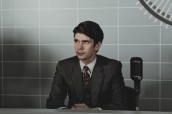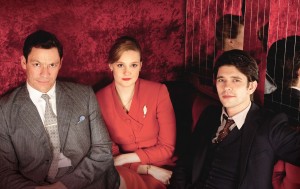THE HOUR is back for a second season on BBCA America. It’s now 1957 and we’re back in the offices and studios of the British news program “The Hour,” where producer Bel (Romola Garai), anchorman Hector (Dominic West) and journalist Freddie (Ben Whishaw) have all reconvened ten months after the harrowing events of the first season.
Writer/producer Abi Morgan created THE HOUR, and also wrote the screenplay for last year’s feature film THE IRON LADY, which earned Meryl Streep another Best Actress Oscar for playing Margaret Thatcher. Morgan is present at the party BBC America is throwing for the Television Critics Association in a restaurant decorated to resemble one of the primary locations on another BBCA series, COPPER. Morgan steps outside so that her voice can be heard over the energetic live bluegrass music within to talk about the new year of THE HOUR.
ASSIGNMENT X: Were you expecting to do a second season of THE HOUR, or did you get it and think, “Oh, God, we’ve got a second season and now what?”
ABI MORGAN: The latter. I think in many ways, when you start to create those characters, you want to come back to them. Halfway through [first season], I had an inkling [doing a second season] would be exciting. But I keep my head down and wrote to the end. I was very enamored with the Suez crisis, and I had to hold the story around that, that historical situation, so when I got to the end of that, it was more like, “Okay, where am I going to come back, what time am I going to come back?” It’s a pleasure to come back again, but I’m not used to the long form, so it’s quite a different thing for me.
AX: When you thought about coming back to Bel and Hector and Freddie, how did you decide where you wanted to resume their stories?
MORGAN: It felt like I really had to pick them up where I’d left them, although we come back ten months later. I allowed that ten months to give them some point of change. For example, the love interest between Hector and Bel isn’t there any more. There’s huge affection, there’s huge fondness and I think it reinforces the storytelling. I think you see Bel very supportive of Hector and really understanding of his foibles because she’s had an affair with him, but you actually see it’s the dark night of the soul for Hector and he’s questioning himself, he’s questioning his marriage, he’s questioning why he’s got into the news and what he’s becoming.
And you have Bel who, when we entered the series, she was a woman who actually stood up and was willing to take the rap and lose her job for putting on the show she believed in. By Series 2, I think you see a woman who’s very empowered by that choice; she’s delivering a great news show, and have a new love interest in the form of Bill Kendal [played by Tom Burke], who is the editor of “Uncovered,” which is a rival TV show. So there’s a sort of new dynamic, and Freddie comes back into that, and in a way, he’s kind of Bel’s nemesis.
In Series 1, there’s a sort of sibling relationship between them and there’s a kind of sense that they love each other, they can’t live with each other, they can’t live without each other. In 2, I think Freddie actually raises his game and has to really decide who he wants to be with. So in many ways, it was less about where I wanted them to go; it was more about starting it. You know, when you’re writing that stuff, you’re writing very fast, so you’re not entirely sure about the end point; you’re just writing the beginning scene [of] where they’re going.
AX: In Series 1, it was a big story issue that Freddie was not deemed to be telegenic, and now he’s being put on the air this season. So has the public perception of “telegenic” changed, has Freddie changed …?
MORGAN: I think Freddie’s changed. In truth, we all know that Ben Whishaw’s pretty gorgeous, but I think it’s more that his attitude’s changed, he’s more ambitious and he’s more willing to fail, and to a certain degree, I think what you get at the end of this is that he likes being on the front seat, but the real brilliant actor is Hector, and what [Freddie] is really good at is being a journalist, and that’s where his true heart lies. So although we give him this foray, and I think the look of him has slightly shifted in the second series, ultimately, I think he comes through at the end of the series that his real métier is journalism.
AX: So when we first encounter Freddie in Season 2, has he become a little more conventional than he was in Season 1?
MORGAN: Actually, not conventional. I think he’s seen the meritocracy which is America, where you can be anything, you can do anything. He’s been [born] into the class system in Britain, so what he comes back [from America] with is fueled by the wisdom of Ed Murrow and Walter Cronkite, and the kind of brilliance of those journalists who are iconic, and he’s very inspired by that. America [in the late Fifties/early Sixties] is ahead of [England] in many ways – musically, socially, the civil rights movement had kicked in way before us – and so I think he comes back very invigorated by America. And so he brings that kind of sense of change to “The Hour.” So I think you do see a different Freddie, but I think it’s more about where he’s come from, as opposed to where he’s going to.
AX: Are you doing more comparison between where the U.S. and the U.K. were in broadcast history in that period?
MORGAN: Actually, you start to see that television news is a huge industry, and it’s really pulling in viewers and it’s not just the dry half-hour, the warm-up act to the kind of light entertainment that it follows; it’s become an entity on its own and I think the competitive nature of television in the late Fifties at that time, and the birth of ITV and ITN News actually had made “The Hour” raise their game. So as much as anything, it’s less about following, parroting America, [than] being inspired by America and actually seeing that influencing not only “The Hour,” but other television news programs of the time.
AX: In Season 1, you had a driving mystery throughout, dealing with spies and governmental falsehoods. Is there a similar driving mystery in Season 2?
MORGAN: Yeah. There’s a different kind of thriller – it’s less bound by a huge historical event [in Season 1, the Suez Canal crisis]. It’s really about a sort of time bomb ticking socially, culturally, economically in the U.K. at the time and the kind of global time bomb with the coming of the nuclear age. So what you realize is, there is a domestic gangland [struggle] going on in Soho, and there’s a bigger gangland power [struggle] going on with America,Russia and Britain in the nuclear arms race. So there is still that kind of thriller intrigue, but I don’t it centers around one big event in the same way.
AX: Did Meryl Streep winning an Oscar, playing the role you’d written for her in IRON LADY, change your career path in any way? I mean, has it opened any doors, or are the doors pretty much open for you anyway at this point?
MORGAN: Well, I think working with Meryl and working with the creative team on THE IRON LADY inherently made you raise your game. I hope I improved and learned from it. But I think in some ways it’s a clearer reference point to say, “Yeah, I wrote THE IRON LADY.” I think Meryl’s performance is pretty memorable, but you know, I didn’t get the Oscar, she did. So I’m hugely proud of the fact that she did so well with that, because she’s such an amazing actress and an amazing woman. Maybe it just makes people reference me more, but as a writer, you just keep your head down and keep working and just hope the work will keep coming in, so I try not to think whether or how it’s changed my career, because I don’t think it fundamentally has. I work predominantly in the U.K., so I was quite well known in the U.K. before, but it’s been a nice thing.
AX: Do you have any other projects going on right now?
MORGAN: Yeah. I [wrote and am involved in] editing THE INVISIBLE WOMAN, which is a new feature film with Ralph Fiennes [directing and] playing Charles Dickens, and it’s about his secret love affair with Nelly Ternan, an actress. So I’ve been doing that, and then I’m likely onto a new feature film. One is about the suffragettes and the other is THE LITTLE MERMAID with Joe Wright, which hopefully will shoot next year.
AX: Would you be open to a third series of THE HOUR?
MORGAN: I love those characters and I’m really excited to create more characters, so fundamentally, I’d love to see it develop and grow. But we’ve just got to see. The big thing about television and what’s great about it is, it’s to do with whether people turn it on, and that’s what you want to do. And I think if they don’t turn it on, then you have to be honest with yourself and go, “Okay, let’s move on.” But I’d love to feel there’s still life in it. I mean, I’ve got a lot more stories I want to tell. There are loads more years of periods of history I want to get into, so yeah, I’d love to be in the Sixties.
AGREE? DISAGREE? LET US KNOW HOW YOU FEEL – COMMENT BELOW!
Related: Exclusive Interview with THE HOUR star Romola Garai
Related: Review: THE HOUR – Series 1 – “Episode 1”
Related: Exclusive Interview with THE HOUR creator Abi Morgan
Article Source: Assignment X
Article: Exclusive Interview with THE HOUR creator Abi Morgan on Season 2
Related Posts:












